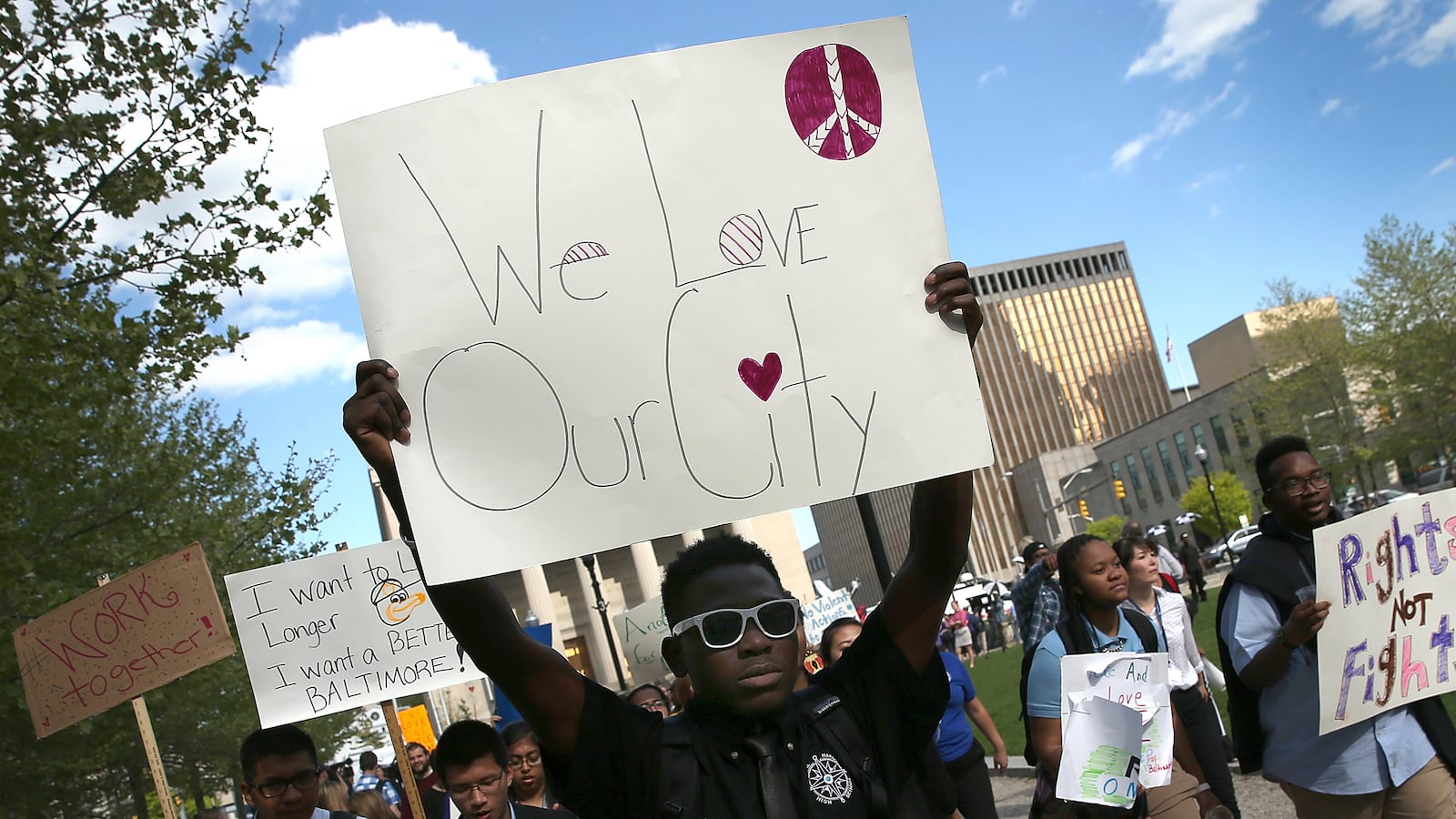Wednesday, with all eyes on our city, my Baltimore high school students were back in class. Every one of my students knows about Freddie Gray, whose death in police custody from a severe spinal cord injury set off the protests in Baltimore. He is more than just a name in these halls, members of his family have been in my classroom.
Tuesday, for the first time in my decade of teaching, school wasn’t closed for a holiday or weather emergency, but because the city of Baltimore itself had been deemed a threat to our students.

The view of Baltimore from inside its schools isn’t what you see on TV. There’s more here than just anger and tragedy, victims and thugs. Our students are now at the center of a national drama, in which they are both playing a part and watching as a lot of other people scramble to explain who they are and what they’re feeling. Politicians, pundits, police and opportunists have all had a chance to explain Baltimore. When school reopened Wednesday we gave the students a chance to speak for themselves.
Of nearly 400 students at my public charter school in northeast Baltimore, 86% identify as African American, and 67% receive free and reduced priced lunch. The fact that only two-thirds of my students have parents whose income level is low enough to qualify for that kind of financial assistance actually makes us better off than a lot of Baltimore public schools.
I heard a clergyman say Baltimore was in a state of emergency long before this event. My students know that the violence will not stop because the National Guard patrols their streets. The violence will not stop because a curfew keeps them in their houses. The violence will not stop because the spectacle is over. If people really want to understand Baltimore they should look more closely at its schools, where the city’s problems and its promise both reside.
Wednesday, the school lobby was covered in paper asking the question: What do you want people all over the world to know about you and about Baltimore? Students took up markers to write their thoughts. Several wrote variations on the theme, “I am not a thug.” One wrote, “I am an innocent bystander.” Still others expressed their love for the city.
There was a lot of excitement between students happy to see each other again. Still, with so much going on, Kache said, “I feel discombobulated because I am so confused.”
We talked for a while, and throughout the day I asked students to write.
Cienna wrote, “Dear world: please do not judge. Some of you only see one side of the situation. The love I have for my city has not weakened. I’m proud to say I’m from Baltimore.”
Onyae’ wrote, “Baltimore isn’t just another city to me. Baltimore city is my home, always has been, always will be.”
Mionna wrote, “As a Baltimorean, I am disgusted. How could my city do this? How could you destroy your own community?”
Rebecca wrote, “I am angry. I am beyond angry. I am disappointed. I am angry not just because of what happened to Freddie Gray, but now because of the way he was forgotten.”
Mikaela wrote, “Police brutality should not be accepted. It took a riot in Baltimore for the government to address the issue as a serious matter that needs to change. I do not believe the people rioting did it for Freddie Gray. Those who rioted did it to feel empowered. Violence should never be okay in any form, and using violence to fight violence will just make matters worse.”
Shabazz wrote, “The plan was to be heard, not ruin things for others...Why not aim high? That’s what I want.”
Liam wrote, “I watched the mayor Monday night. It seemed like she wasn’t from Baltimore, had no connection to the people. She just didn’t care. She was talking about the rioters when she said, “These thugs…” That’s when I thought to myself, these people aren’t thugs. These are people I know, my age, people I grew up with, my friends. Most of the people are good people. I see more good criminals than good cops, more bad cops than bad criminals. I may not know everybody involved, nor was I involved, but I do know these people are not thugs.”
Diamonte’ wrote, “To me the wrongs are even now. We gotta see how doing this riot and destroying things got the attention we wanted the whole time...sometimes you gotta get someone to listen.”
When I asked Kevin to write, he refused. He said, “Ain’t nobody gonna read this.”
Malachi jumped in, “That’s true though. Ain’t nobody tryna hear what we sayin’”—
Deyquan interrupted, “This is a serious matter, though.”
Kevin explained, “Ain’t nobody gonna listen to this because we are the community. We are the teenagers that they labeled thugs. When they were saying thugs, what they really tryna say was, ‘Black teenagers, niggers, that live in the hood.’ That’s not me.”
Malachi added, “They put everybody in the same category. They already called us thugs so they aint gonna listen to us.”
Deyquan said, “It’s easy to push our city down, but it’ll take years to pull our city back up.”
Anaya said, “My mother expects more out of me, and I expect more out of myself. I have high expectations of myself. It’ll never be the same now.”
Malachi said, “The only way they listen is with actions. That’s why they say actions are louder than words. Now the whole world knows.”
Over the past decade, I’ve seen different sides of Baltimore. I’ve worked with students who try and students who don’t. I’ve worked with families who seem to care a lot, and families who don’t appear to care at all.
I’ve worked alongside young people as they endure 45 degree classrooms with no heat and 96 degree classrooms with no air conditioning. I’ve seen bathrooms broken and left in disrepair, their doors locked, and students denied the right to relieve themselves for hours at a time.
I worked in a school where students were herded from broken down classroom to broken down classroom, where they were harangued throughout the day for not wearing a uniform, or not tucking in a shirttail, or needing a drink of water.
I’ve seen students confront police and police confront students. I’ve seen a police officer take a student to the ground for nothing more than wisecracks about being late to class.
I’ve seen students denied access to public buses, and I’ve seen students attack and damage a bus that denied them. I saw a student trying to get a ride home get his ankle run over and broken as he tried to board a bus denied to him.
I’ve had students who were shot, and students who may have done some shooting. I had an honors student shot multiple times just weeks before graduation. He narrowly survived.
Yesterday we were back in class. Outside it was beautiful; bright, blue sky, spring flowers. One advisory group walked the mile or so to Baskin-Robbins. They put on gloves, grabbed trash bags, and picked up trash along the way. People thanked them, and drivers honked.






